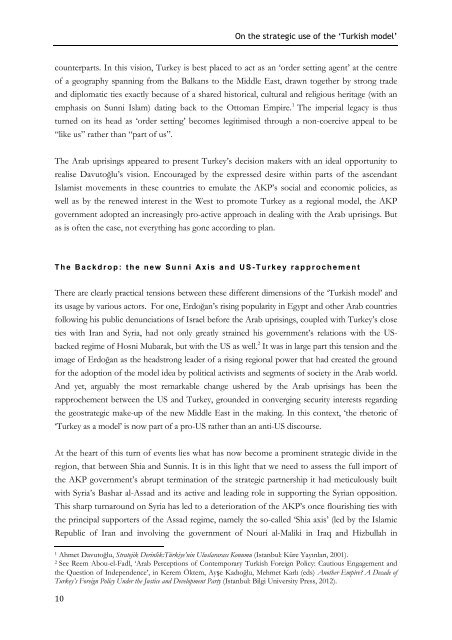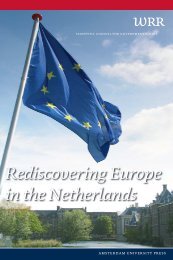The Western Condition - St Antony's College - University of Oxford
The Western Condition - St Antony's College - University of Oxford
The Western Condition - St Antony's College - University of Oxford
You also want an ePaper? Increase the reach of your titles
YUMPU automatically turns print PDFs into web optimized ePapers that Google loves.
On the strategic use <strong>of</strong> the ‘Turkish model’<br />
counterparts. In this vision, Turkey is best placed to act as an ‘order setting agent’ at the centre<br />
<strong>of</strong> a geography spanning from the Balkans to the Middle East, drawn together by strong trade<br />
and diplomatic ties exactly because <strong>of</strong> a shared historical, cultural and religious heritage (with an<br />
emphasis on Sunni Islam) dating back to the Ottoman Empire. 1 <strong>The</strong> imperial legacy is thus<br />
turned on its head as ‘order setting’ becomes legitimised through a non-coercive appeal to be<br />
“like us” rather than “part <strong>of</strong> us”.<br />
<strong>The</strong> Arab uprisings appeared to present Turkey’s decision makers with an ideal opportunity to<br />
realise Davutoğlu’s vision. Encouraged by the expressed desire within parts <strong>of</strong> the ascendant<br />
Islamist movements in these countries to emulate the AKP’s social and economic policies, as<br />
well as by the renewed interest in the West to promote Turkey as a regional model, the AKP<br />
government adopted an increasingly pro-active approach in dealing with the Arab uprisings. But<br />
as is <strong>of</strong>ten the case, not everything has gone according to plan.<br />
<strong>The</strong> Backdrop: the new Sunni Axis and US-Turkey rapprochement<br />
<strong>The</strong>re are clearly practical tensions between these different dimensions <strong>of</strong> the ‘Turkish model’ and<br />
its usage by various actors. For one, Erdoğan’s rising popularity in Egypt and other Arab countries<br />
following his public denunciations <strong>of</strong> Israel before the Arab uprisings, coupled with Turkey’s close<br />
ties with Iran and Syria, had not only greatly strained his government’s relations with the USbacked<br />
regime <strong>of</strong> Hosni Mubarak, but with the US as well. 2 It was in large part this tension and the<br />
image <strong>of</strong> Erdoğan as the headstrong leader <strong>of</strong> a rising regional power that had created the ground<br />
for the adoption <strong>of</strong> the model idea by political activists and segments <strong>of</strong> society in the Arab world.<br />
And yet, arguably the most remarkable change ushered by the Arab uprisings has been the<br />
rapprochement between the US and Turkey, grounded in converging security interests regarding<br />
the geostrategic make-up <strong>of</strong> the new Middle East in the making. In this context, ‘the rhetoric <strong>of</strong><br />
‘Turkey as a model’ is now part <strong>of</strong> a pro-US rather than an anti-US discourse.<br />
At the heart <strong>of</strong> this turn <strong>of</strong> events lies what has now become a prominent strategic divide in the<br />
region, that between Shia and Sunnis. It is in this light that we need to assess the full import <strong>of</strong><br />
the AKP government’s abrupt termination <strong>of</strong> the strategic partnership it had meticulously built<br />
with Syria’s Bashar al-Assad and its active and leading role in supporting the Syrian opposition.<br />
This sharp turnaround on Syria has led to a deterioration <strong>of</strong> the AKP’s once flourishing ties with<br />
the principal supporters <strong>of</strong> the Assad regime, namely the so-called ‘Shia axis’ (led by the Islamic<br />
Republic <strong>of</strong> Iran and involving the government <strong>of</strong> Nouri al-Maliki in Iraq and Hizbullah in<br />
1 Ahmet Davutoğlu, <strong>St</strong>ratejik Derinlik:Türkiye’nin Uluslararası Konumu (Istanbul: Küre Yayınları, 2001).<br />
2 See Reem Abou-el-Fadl, ‘Arab Perceptions <strong>of</strong> Contemporary Turkish Foreign Policy: Cautious Engagement and<br />
the Question <strong>of</strong> Independence’, in Kerem Öktem, Ayşe Kadıoğlu, Mehmet Karlı (eds) Another Empire? A Decade <strong>of</strong><br />
Turkey’s Foreign Policy Under the Justice and Development Party (Istanbul: Bilgi <strong>University</strong> Press, 2012).<br />
10

















